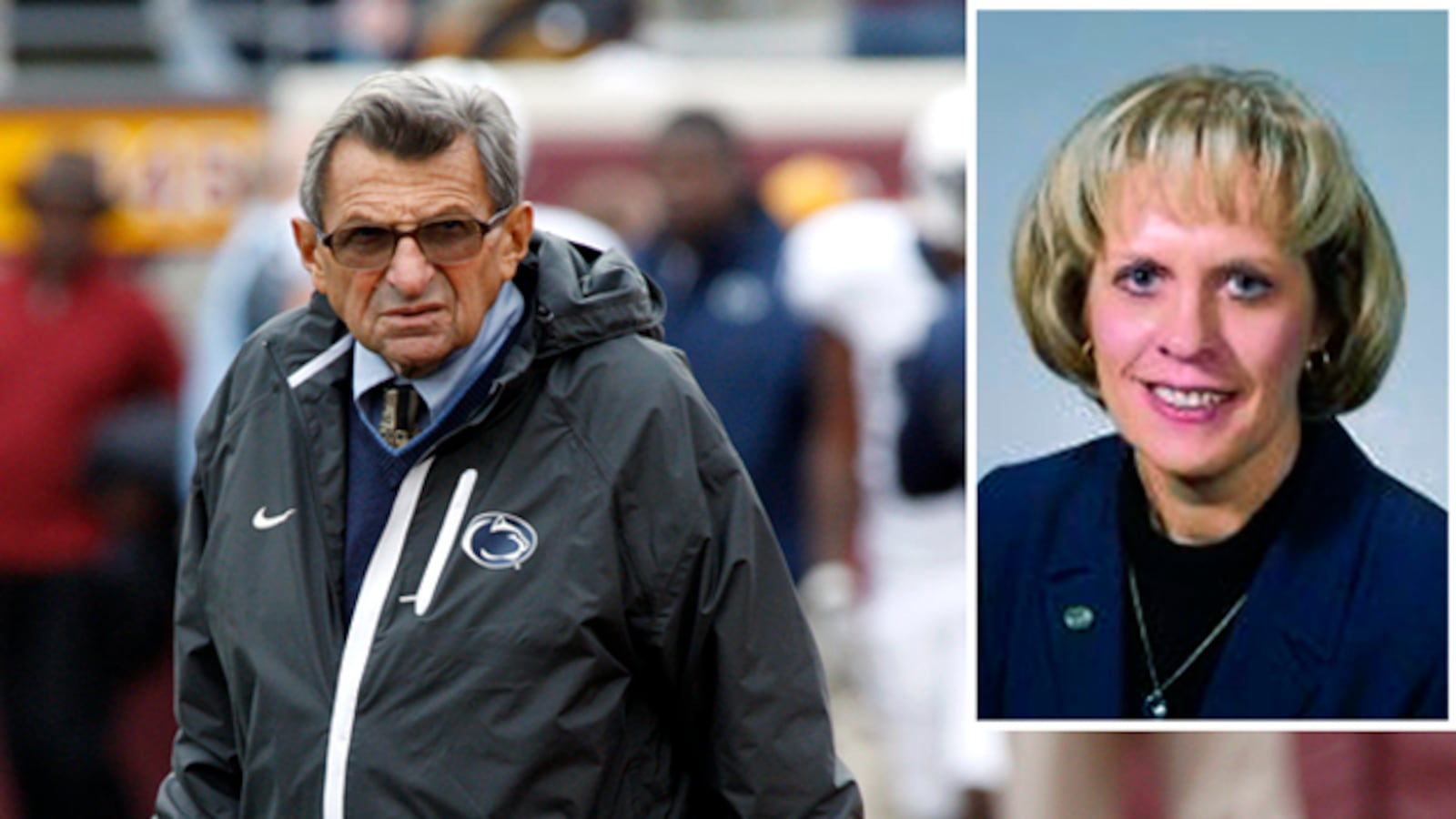This is how long it takes to become a celebrity in the Penn State saga: exactly one day. On Monday, Vicky Triponey was living in South Carolina in anonymity. By Tuesday, she’d made the front page of The Wall Street Journal. ESPN was calling. Reporters had shown up at her door.
Triponey was vice president of student affairs at Penn State from 2003 to 2007—and allegedly was fired after butting heads with football god Joe Paterno, when she tried to punish a number of his players for crimes that ranged from bar fights to sexual assault.

She was basically run out of town. According to Triponey, whose story is backed up by the local chief of police, people knocked on her door late at night, then bolted when she went to answer it. Students prank-called her and savaged her on message boards. One morning, she woke up to find a "For Sale" sign in her yard. Even Paterno—when he appeared on a local sports radio show in the fall of 2005—proclaimed that “that lady in Old Main” (referring to the university’s administrative building) didn’t know how to deal with students because “she didn’t have kids.”
“This was creating an environment that put me completely on edge,” Triponey told The Daily Beast.
The abuse got to a point, she says, where the local police had to install a camera outside her door.
But it was too late—Triponey was already on her way out the door.
On Sept. 12, 2007, Triponey and the university parted ways over what her boss, president Graham Spanier—the man who’d hired her—called her “aggressive” management style, she says. On multiple occasions, in conversations about her performance, he told her she wasn’t fitting in with the “Penn State way,” and that she was too “pushy” and “confrontational,” she recalls.
The day she left, sources say, she was escorted out of the building by security guards.
Triponey was not without controversy during her tenure. She was criticized for cutting funding to the student radio station, reorganizing the student government, and changing the way student fees were allocated.
A spokeswoman for Penn State told The Daily Beast on Tuesday that there is “no statement” related to Triponey. Paterno’s lawyer, Wick Sollers, said that Triponey's allegations are "out of context, misleading, and filled with inaccuracies."
But as Triponey tells it, all she’d been trying to do was her job—which meant restoring a sense of discipline to a football program that had gone out of control. She’d come from the University of Connecticut, where she was vice chancellor for student affairs. She had more than 30 years of experience in higher education. Her husband, Michael Meacham, was a professor of health and policy administration.
When she applied for the position, she says, the advertisement called for a “leader” in the field, somebody who could help build a “world class” student-affairs program. At her first board meeting, she says, president Graham Spanier introduced her as “one of the best.” The student-affairs newsletter deemed her “committed to Penn State pride.” She was one of a few high-level administrators who were not Penn State alums.
“This was one of the plum, top-notch jobs in the country,” Triponey remembers.
But she arrived on campus during a delicate time. The Nittany Lions, the famed football team Paterno presided over, were in a funk. Spanier was attempting to ease Paterno into retirement. In late 2002, Penn State cornerback Anwar Phillips was accused by a classmate of sexual assault, and the university suspended him for two semesters. But before his suspension began, the Nittany Lions were to play in the Capital One Bowl. Paterno put Phillips in uniform, causing an uproar on and off campus.
Over the next two years, there were multiple other serious behavior infractions involving football players. Over and over, Triponey was sidelined or told to stay out of it. In August 2005, Triponey says, Paterno urged her, in an email that has since become public, to “leave discipline of football players to the coach” and to “eliminate [the] off-campus code”—which stated that students who committed crimes outside Penn State’s boundaries could still be sanctioned by university officials.
“That was one of the ongoing concerns,” says Triponey. “That we should not have authority over whether Paterno’s players should practice or play in games.”
Then there was the Meridian case, in April 2007—a fight at an off-campus housing complex that was the beginning of the end, she says. Within five months, Triponey was out of a job.
The brawl—which the Office of Judicial Affairs called “brutal in nature”—involved at least a dozen people, and led to the arrest of six football players, who were charged with crimes ranging from criminal trespassing to assault. Most of the criminal charges were dropped, but the university opened its own inquiry. There were at least half a dozen meetings about how to deal with the sanctions. At one point, Triponey says, witnesses—most of whom were footballers—were ordered to appear at a judicial hearing, as was school policy. But Paterno sent a text message to the whole team, saying, “If you show up for this, you’re off.”
In the end, four players were suspended for a summer semester—but were back in time for the fall season.
“The sanctions were much less severe than what they should have been according to the guidelines in the code of conduct,” Triponey says.
A year later, Paterno told reporters at a press briefing that “maybe I didn't do the best job I could have” related to the incident.
In the wake of the Jerry Sandusky scandal, Triponey has become the latest media focus—yet another window into the strange, secret world that is Penn State.How she describes the culture? “A blind sense of loyalty—not just at the top, but at all levels.”“I think people, in order to keep their jobs, have had to turn a blind eye," she says.







